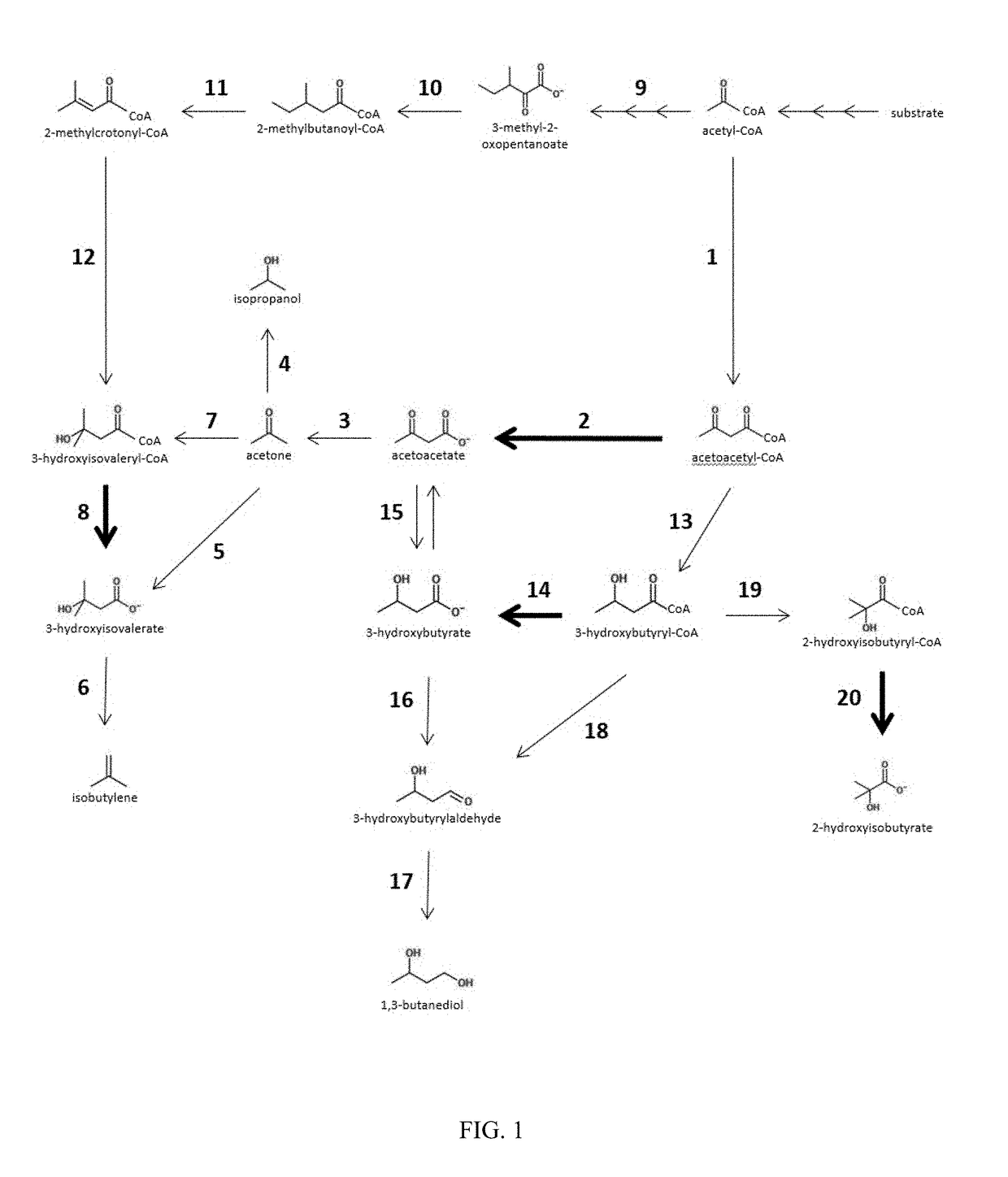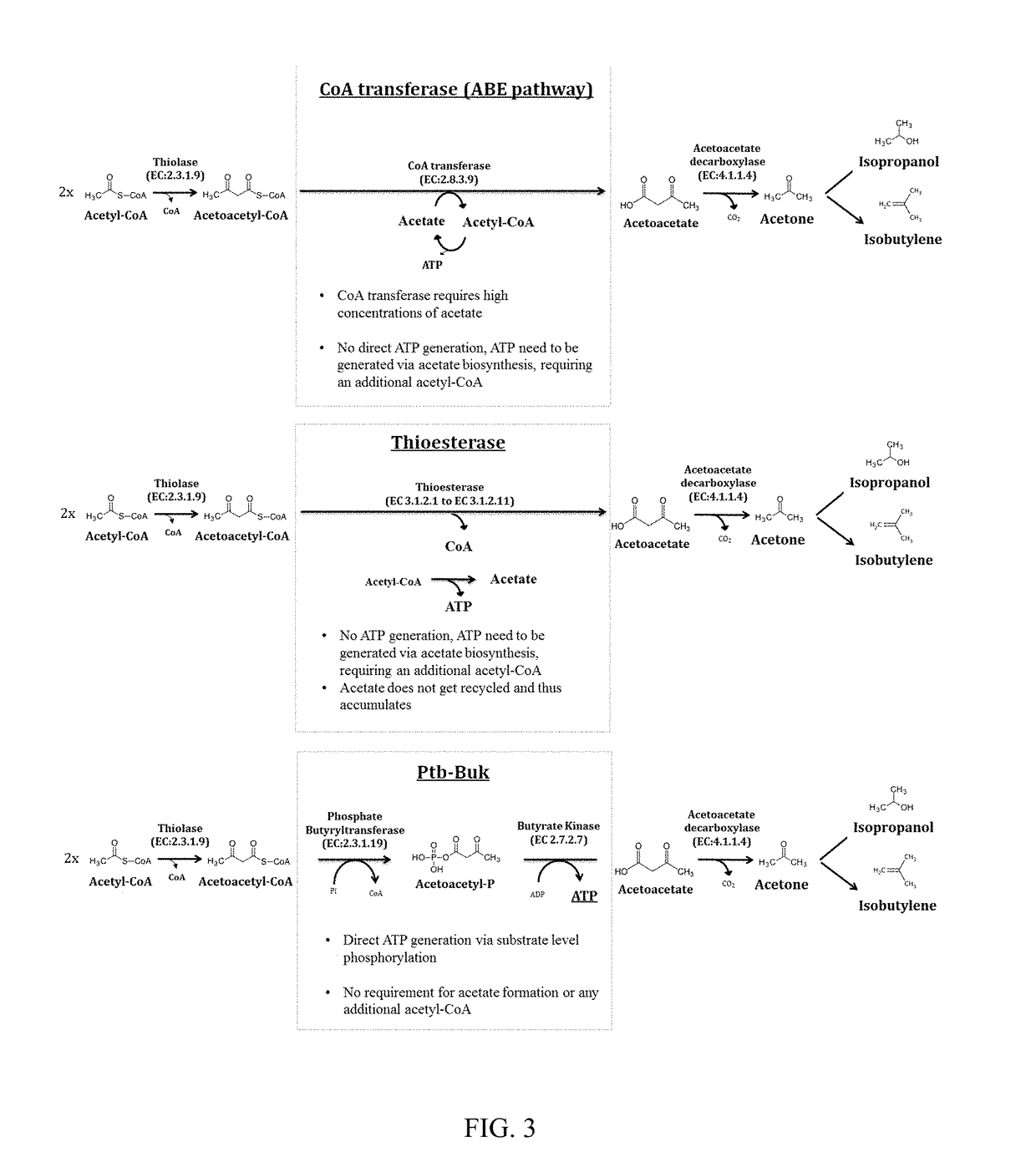Genetically engineered bacterium comprising energy-generating fermentation pathway
a technology of energy-generating fermentation and genetic engineering, which is applied in the direction of enzymology, transferases, waste based fuel, etc., can solve the problems of restricting product yield in energy-limited systems and uncoupling product production from microorganism growth
- Summary
- Abstract
- Description
- Claims
- Application Information
AI Technical Summary
Problems solved by technology
Method used
Image
Examples
example 1
[0233]This example demonstrates the ability of Ptb-Buk to convert acetoacetyl-CoA to acetoacetate in E. coli in vivo and its use in production of acetone, isopropanol, 3-hydroxybutyrate, and isobutylene
[0234]Pathways that rely on the Ptb-Buk system for acetoacetate production from acetoacetyl-CoA were designed and constructed. This was done in a modular fashion using a pDUET vector system (Novagen). One module contained ptb-buk genes from C. beijerinckii NCIMB8052 (GenBank NC_009617, position 232027 . . . 234147; Cbei_0203-204; NCBI-GeneID 5291437-38) on plasmid pACYC. Another module contained the thiolase gene thlA of C. acetobutylicum (Genbank NC_001988, position 82040 . . . 83218; CA_P0078; NCBI-GeneID 1116083) and the acetoacetate decarboxylase gene adc of C. beijerinckii NCIMB8052 (Genbank NC_009617, position 4401916 . . . 4402656; Cbei_3835; NCBI-GeneID 5294996) on plasmid pCOLA. Ptb and buk genes were amplified from genomic DNA of C. beijerinckii NCIMB8052 and thlA and adc ge...
example 2
[0245]This example demonstrates the ability of Ptb-Buk to convert acetoacetyl-CoA to acetoacetate in C. autoethanogenum in vivo and the use of Ptb-Buk in the production of acetone, isopropanol, 3-hydroxybutyrate, and isobutylene from a gaseous substrate.
[0246]To demonstrate that the Ptb-Buk system also allows acetone, isopropanol, or isobutylene synthesis from gaseous substrates, a plasmid was constructed that contains the same genes as in Example 1, thl+ptb-buk+adc under control of a clostridial promoter on a shuttle vector that allows expression in acetogens such as C. autoethanogenum, C. ljungdahlii or C. ragsdalei.
[0247]The pMTL plasmid is a shuttle plasmid system for introducing circular dna into Clostridia via E. coli conjugation (Heap, J Microbiol Methods, 78: 79-85, 2009. The genes of interest (i.e., hbd, phaB, thlA, ptb, buk, and aor1) were cloned into the lacZ region of the plasmids using common techniques in molecular biology including dna restriction digestion followed ...
example 3
[0263]This example demonstrates the ability of Ptb-Buk to convert (R)-3-hydroxybutyryl-CoA to (R)-3-hydroxybutyryrate in E. coli in vivo for production of (R)-hydroxybutyrate, acetone, isopropanol, or isobutylene.
[0264]Pathways were designed and constructed that rely on the Ptb-Buk system for (R)-3-hydroxybutyrate production from (R)-3-hydroxybutyryl-CoA. Additionally, a 3-hydroxybutyrate dehydrogenase (Bdh) was utilized for conversion of (R)-3-HB to acetoacetate. It has been reported that Ralstonia pickettii have two 3-hydroxybutyrate dehydrogenases Bdh1 and Bdh2 that are able to convert 3-hydroxybutyrate to acetoacetate in vitro (Takanashi, J Biosci Bioeng, 101: 501-507, 2006). One pathway was designed making use of this enzyme for acetone production (steps 1, 13, 14, 15, 3 of FIG. 1), while recycling the reducing equivalents produced in the production of (R)-3-hydroxybutyryl-CoA and the ATP generated by Ptb-Buk (FIG. 6).
[0265]The pathways were constructed in a modular fashion usi...
PUM
| Property | Measurement | Unit |
|---|---|---|
| flow rate | aaaaa | aaaaa |
| pH | aaaaa | aaaaa |
| RI | aaaaa | aaaaa |
Abstract
Description
Claims
Application Information
 Login to View More
Login to View More - R&D Engineer
- R&D Manager
- IP Professional
- Industry Leading Data Capabilities
- Powerful AI technology
- Patent DNA Extraction
Browse by: Latest US Patents, China's latest patents, Technical Efficacy Thesaurus, Application Domain, Technology Topic, Popular Technical Reports.
© 2024 PatSnap. All rights reserved.Legal|Privacy policy|Modern Slavery Act Transparency Statement|Sitemap|About US| Contact US: help@patsnap.com










